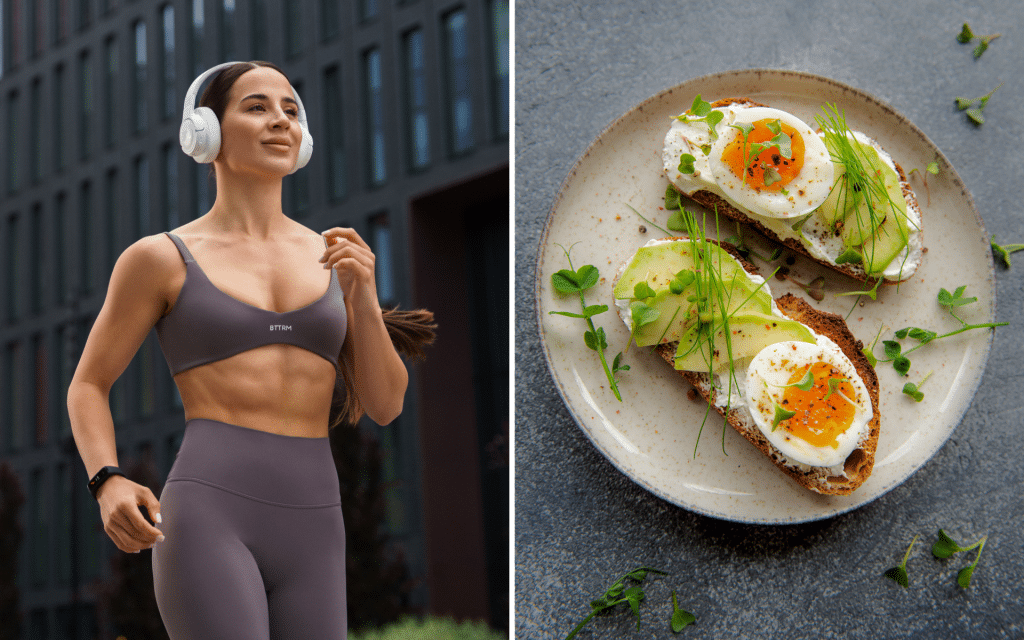Gluten is a protein that is found in certain grains such as wheat, barley, and rye. It gives bread and other baked goods their elasticity and helps them maintain their shape.
For most people, consuming gluten doesn’t cause any harm. However, for those with celiac disease or non-celiac gluten sensitivity (NCGS), ingesting even small amounts of gluten can lead to adverse reactions (1).
A gluten-free diet has become increasingly popular in recent years, as a growing number of people are choosing to eliminate gluten from their diets.
Many believe that cutting out gluten can lead to weight loss, improved digestion, and increased energy. However, the truth is that going gluten-free can have both positive and negative effects on your body.
What Is Gluten?
Gluten is a group of proteins found in wheat and related grains such as barley and rye. It gives dough its elasticity, helping it rise and maintain its shape, and often gives the final product a chewy texture (2).
Gluten is commonly found in foods such as bread, pasta, and baked goods. Some people, such as those with celiac disease or gluten sensitivity, need to avoid gluten due to health reasons.
Who Needs to Stop Eating Gluten?
People who need to stop eating gluten typically include those with celiac disease, non-celiac gluten sensitivity, and wheat allergies.
- Celiac Disease: This is an autoimmune disorder where ingesting gluten leads to damage in the small intestine. People with celiac disease must strictly avoid gluten to prevent symptoms and intestinal damage (1).
- Non-Celiac Gluten Sensitivity: Some individuals experience symptoms that are similar to celiac disease when consuming gluten, but they don’t test positive for celiac disease. These individuals may benefit from a gluten-free diet (1).
- Wheat Allergy: This is an allergic reaction to proteins found in wheat, including but not limited to gluten. Avoiding any wheat-containing products is necessary for preventing allergic reactions (3).
In addition to these groups, some people choose to follow a gluten-free diet for personal or health reasons, although it’s not medically necessary for them.
What Happens to Your Body When You Stop Eating Gluten?
- Less Inflammation
Gluten is known to cause inflammation in the intestines of people with celiac disease. Over time, this leads to damage to the small intestine’s lining (4).
If you’re intolerant to gluten and you’ve given it up, chances are your inflammation levels will decrease in your gut. This could allow your body to heal in the absence of the trigger (gluten).
- Higher Energy Levels
If you have celiac disease or other gluten intolerance, a gluten-free diet will decrease inflammation in your gut and increase the absorption of nutrients you may not have been absorbing before. Your energy may also spike as a result of the elimination of the foods that were causing your symptoms, which may have included fatigue (5).
- More Hunger
Some people find themselves feeling hungry more often throughout the day when they first stop eating gluten (5). This may happen because eliminating gluten-containing foods has decreased your energy intake, so your body is sending you signals that you need more energy.
Try eating more filling protein, healthy fats, complex carbs, and fiber from gluten-free whole grains, fruits and vegetables, pulses, seeds and nuts, and other gluten-free foods. If the feeling persists, talk to your healthcare provider.
If you wish to free yourself from all the extra pounds that have been weighing you down for way too long, start using the BetterMe: Health Coaching app and overhaul your entire life!
- Frequent Constipation
After going gluten-free, many people experience frequent constipation (5). This negative side effect of a gluten-free diet happens for several reasons:
- Your body is adjusting to a life without an autoimmune response to certain foods and taking the time to find balance in normal functioning.
- You may have been experiencing gluten-related digestive issues that haven’t gone away completely after going gluten free – potentially leading you to be more irregular than usual.
- Not eating enough fruits and vegetables on a gluten-free diet can cause constipation. It’s important to get enough fiber in your diet (6). If you used to get most of your fiber from gluten-containing grains, you’ll need to find new sources.
- You could also be eating lots of highly processed foods on your new gluten free diet, which typically lack adequate fiber.
Whatever the case, adding more fruits, vegetables, pulses, and whole (gluten-free) grains to your diet can help increase fiber intake and decrease constipation. Fiber is a wonderful nutrient that helps move the digestive system along, so make sure you’re eating plenty of it (6).
- Potential Nutrient Deficiencies
Cutting out gluten entirely can also result in a reduced intake of essential nutrients such as fiber, iron, and B vitamins. This is because many whole grains that contain gluten are good sources of these nutrients (5). Without careful planning and monitoring, individuals may become deficient in these important vitamins and minerals. Work with your healthcare provider or a registered dietitian to make sure you’re getting all the nutrients you need on a gluten-free diet.
Read more: Gluten Free Bread Recipes: Light, Fluffy, and Delicious Breads
Why Is a Gluten-Free Diet Necessary?
The short answer is that some people are intolerant of gluten, which means their bodies don’t process it properly. For these people, eating gluten triggers negative reactions in the body that can cause everything from digestive trouble to skin problems and headaches (7).
If you suspect you may have a problem with gluten, you should speak to your doctor about testing for celiac disease or non-celiac gluten sensitivity.
Find healthy Bread Alternatives that satisfy your cravings while supporting your nutritional goals, offering delicious options that are low in carbs, rich in nutrients, and perfect for a balanced diet.
Will a Gluten-Free Diet Help You Lose Weight?
Some people lose weight on a gluten-free diet because eliminating gluten-containing foods reduces their overall calorie intake. However, if you’re not careful, you could end up consuming more calories than before. Remember: some gluten-free snacks, cereal bars, and convenience foods can have just as many or more calories as the foods they are replacing.
To lose weight on a gluten-free diet, you must incorporate other weight loss measures, such as (8):
- Understanding calorie counts for gluten-free foods
- Keeping portion sizes in check
- Eating more lean protein such as fish, white meat chicken, and turkey
- Incorporating high-fiber whole grains, fruits, and vegetables
- Drinking lots of water
- Getting some exercise
How Long After Going Gluten-Free Do Symptoms Go Away?
After going gluten-free, many people experience relief from symptoms that are directly related to celiac disease or non-celiac gluten sensitivity.
These symptoms can be uncomfortable and disruptive to daily life. The time it takes for symptoms to go away can vary from person to person. Work with your healthcare provider throughout the whole process and talk to them if you have any questions or concerns.
People with either of these conditions will most likely need to continue eating gluten-free foods for the rest of their lives in order to avoid debilitating symptoms and serious health problems.
The BetterMe: Health Coaching app will provide you with a host of fat-frying fitness routines that’ll scare the extra pounds away and turn your body into a masterpiece! Get your life moving in the right direction with BetterMe!
How to Ease into a Gluten-Free Diet
After going gluten-free, you may feel your entire diet and lifestyle needs to change in order for you to be successful. However, it doesn’t have to be so difficult. You can ease into things and make the transition easier on yourself by following these simple steps:
- Learn Which Foods to Include and Avoid
The most obvious places where people find gluten in their diet is in wheat products such as flour and pasta, but did you know it’s also found in unexpected places such as soy sauce, french fries, and some types of candy? Luckily, there are fantastic resources out there to help you learn what foods to include or avoid in your gluten-free new lifestyle.
Here are the foods you should eat on a gluten-free diet:
- Fruits
- Vegetables
- Meats
- Poultry
- Fish
- Beans and other legumes
- Seeds and nuts
- Whole gluten-free grains such as quinoa, brown rice, buckwheat, amaranth, millet, teff, and sorghum
Here are the foods you should avoid on a gluten-free diet:
- Wheat (including durum flour, triticale, spelt, and other types of wheat)
- Rye
- Barley
- Oats are commonly cross-contaminated during processing, so make sure to carefully read food labels and look for those that are certified gluten-free
If you have celiac disease or non-celiac gluten sensitivity, it’s best to play it safe and skip any foods that may contain wheat.
Try this delicious gluten-free chocolate cupcakes recipe to indulge your sweet tooth without compromising on flavor – it offers a moist and rich treat that’s perfect for any occasion and suitable for those with dietary restrictions.
- Carefully Read Food Labels
Before purchasing something at the grocery store or eating at a restaurant, take a minute to carefully check the ingredients list on the packaging for any type of wheat product that may be lurking inside (i.e. malt vinegar, starch, and dextrin).
It may take some time, but it’ll soon become second nature. You may be surprised by how many ingredients contain wheat or gluten-based grains. When eating out, choose restaurants where you can custom-order your food and check for any hidden sources of gluten in anything they serve (even if something isn’t “flour” based).
When grocery shopping, visit stores where there are plenty of fresh fruits, vegetables, beans, and nuts to choose from that fit into a balanced diet plan. In fact, most processed foods will have their ingredients listed on the packaging these days, which makes it easy to find what’s free of gluten and what’s not.
Read more: 6 Gluten Free Snack Options You Won’t Regret Having In Your Pantry
- Create a Balanced, Fiber-Rich Diet Plan
Without planning ahead, you may not thrive on a gluten-free diet. Consuming enough fibre, protein, complex carbohydrates, and healthy fats is essential when following a gluten-free diet plan and for your health (9). Remember that the goal is to slowly make your way toward healthy eating habits that are sustainable in the long term.
- Watch Out for Sneaky Sources of Gluten
You may be surprised by how many things contain unsuspected amounts of wheat or gluten-based grains. Some examples include soy sauce (which is sometimes fermented with wheat), French fries (they’re typically cooked in the same oil as other foods that contain gluten), and candy (that includes malt).
Yes, it’s okay to not eat gluten, and it’s necessary for individuals who have celiac disease, non-celiac gluten sensitivity, or a wheat allergy. For those without these conditions, a gluten-free diet can still be safe and healthy as long as it’s well-balanced and includes a variety of nutrients. However, there isn’t any health benefit to a gluten-free diet if you don’t have a sensitivity to gluten. It’s important to ensure adequate intake of fiber, vitamins, and minerals that may be less prevalent in gluten-free products. The time it takes to recover from gluten-induced damage varies depending on individual health conditions and the duration of gluten exposure. For those with celiac disease, symptoms may start to improve within a few days to weeks after eliminating gluten, but full intestinal healing can take several months to years. For non-celiac gluten sensitivity, symptoms often improve more quickly, typically within a few days to weeks. However, individual experiences will vary and it’s important to work closely with your healthcare provider. Facial flushing after consuming gluten is not a common symptom that is directly associated with gluten ingestion. However, some individuals with celiac disease or gluten sensitivity may experience skin-related symptoms such as rashes or dermatitis herpetiformis, which could potentially include redness or flushing. If facial flushing occurs consistently after you consume gluten, it may be worth consulting a healthcare provider to explore potential causes. No, we don’t need gluten to survive. Gluten itself isn’t an essential nutrient and doesn’t provide any specific health benefits that can’t be obtained from other sources. A well-balanced diet without gluten can still provide all the necessary nutrients for good health, as long as it includes a diverse range of foods to ensure adequate nutrition. However, eliminating gluten doesn’t have any health benefits unless you have celiac disease, non-celiac gluten sensitivity, or a wheat allergy.Frequently Asked Questions
Is it OK to not eat gluten?
How long does it take to detox from gluten?
Does your face flush after gluten?
Do we need gluten to survive?
The Bottom Line
If you have celiac disease or another gluten sensitivity, your digestive system may feel the most noticeable changes when you stop eating gluten. This can lead to better digestion, less inflammation, and more energy throughout the day. You may also find you have fewer skin issues, experience less cramping after meals, think more clearly, and have higher energy levels in general. If this sounds good to you, then it’s definitely worth trying. You should always talk to your healthcare provider before making any major dietary changes.
DISCLAIMER:
This article is intended for general informational purposes only and does not serve to address individual circumstances. It is not a substitute for professional advice or help and should not be relied on for making any kind of decision-making. Any action taken as a direct or indirect result of the information in this article is entirely at your own risk and is your sole responsibility.
BetterMe, its content staff, and its medical advisors accept no responsibility for inaccuracies, errors, misstatements, inconsistencies, or omissions and specifically disclaim any liability, loss or risk, personal, professional or otherwise, which may be incurred as a consequence, directly or indirectly, of the use and/or application of any content.
You should always seek the advice of your physician or other qualified health provider with any questions you may have regarding a medical condition or your specific situation. Never disregard professional medical advice or delay seeking it because of BetterMe content. If you suspect or think you may have a medical emergency, call your doctor.
SOURCES:
- Celiac disease and non-celiac gluten sensitivity (2015, nih.gov)
- What is Gluten? (n.d., celiac.org)
- Wheat (n.d., acaai.org)
- Intestinal Barrier Function in Gluten-Related Disorders (2019, nih.gov)
- Health Benefits and Adverse Effects of a Gluten-Free Diet in Non–Celiac Disease Patients (2018, nih.gov)
- Health benefits of dietary fiber (2009, academic.oup.com)
- The Gluten-Free Diet: Fad or Necessity? (2017, diabetesjournals.org)
- Weight-Loss and Maintenance Strategies (2003, nih.gov)
- Essentials of Healthy Eating: A Guide (2011, onlinelibrary.wiley.com)











